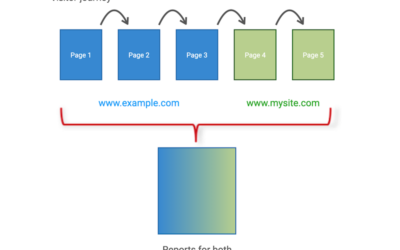I have been following some interesting posts on the recent IBM acquisition of Coremetrics. The following three are from respected sources that all glow positively about the potential upside of the deal – Econsultancy, Eric Peterson, Stephane Hamel.
However, I am not so convinced that the deal will lead to great success for IBM, or is the start of a coming “revolution” for the web analytics industry… and here’s why.
Whilst the deal makes perfect sense – its a logical and smart with obvious synergies, remember that in 2006 IBM *sold* their commercial web analytics tool, Surfaid, to Coremetrics in the first place (though Coremetrics only used the WebSphere client base and not the technology).
Clearly IBM did not understand the significance of web metrics in 2006 and nothing makes me feel that they do now…
For me, the success of the web metrics industry today is due to the “simplification” that Google Analytics has brought to the table with its 2005 acquisition of Urchin. That has taken web analytics out of the realm of IT and into marketing departments – where it belongs!
The result of this simplification has been the dramatic growth in the number web analytics users – now measured in millions of accounts – rather than tens of thousands, as it was in 2005.
In my view, integrating web analytics with marketing is the future.
Integrating web analytics with IT (the SPSS/IBM route) is the past, and flawed.
There is a precedent for this… IBM is not a marketing company, just as NetIQ are not a marketing company – NetIQ were the previous owner’s of WebTrends. As a security and IT infrastructure management company, NetIQ acquired WebTrends in 2001 and took it from clear market leader to almost out of business in less than 4 years. In fact, their flawed approach was a large part of what has driven the success of alternative vendors – including Google Analytics.
I am all for the rigours of statistical analysis, though within reason. The vast majority of your website traffic is anonymous and random visits. These are impossible to predict due to accuracy limitations of web analytics. Yet, these provide the greatest opportunity for improvement.
Ultimately, I do not feel an IT company, such as IBM, are best placed to move the web analytics industry to the next level.
As always, I would be interested in your thoughts with a comment.



I know this article is 6 years old but it was a great read and the information is dead on. You can see how important web analytics are today. Great insight!
Hi Brian
This could prove to be a very smart move by IBM if they manage to consolidate the various companies they acquire into a robust marketing platform.
IBM, Informatica and several other big data companies are in a race to enable businesses to create a “Single view of the customer”. That is to be able to track your custoemr across all applications and touch points. Web analytics is only one of the “customer tracking” / marketing analytics tools in use. Unica fits into this puzzel as it tracks individual users and not just sessions or pages as GA is doing. in addition it is 1 suite together with campaign management and real time campign management. If IBM will succeed in integrating Unica, Coremetrics, SPSS, its customer data integration tools and other applications into one suite, they will have avery powerfull solution. Currently businesses that want to acheive this level of integration have to invest a lot in doing it themselves.
The profiliration of web measurement and improvement tolls in recent years (analytics, taregting, behavioral,VoC, testing…), makes it more and more difficult. Each tool generates its own unique user /visitor ID and transactional data, and you are left out with alot of data and a big headache how to combine all this data in a way that lets you see a full viewof your customer.
Regards
Ziv
An interesting update to this story is IBM’s recent acquisition announcement (Friday 13th August!) of Unica* – another web metrics and business intelligence tool – http://bit.ly/cpj90k
Unica is very much about providing an integrated marketing platform for marketers i.e. combining on and offline tracking. So perhaps there is a revolution in thought happening at IBM…
*Unica acquired Sane Solution’s NetTracker web analytics tool in 2006.
The issue about IBM being successful or not is not about the improper integration as being pointed out in this email but the inclusion of web analytics in the business domain and moreover web analytics in the path to profitability for any business. This is what made IBM take Coremetrics. What do the others say?
That of course makes sense, though as I mention in the post, IBM sold their web analytics tool/business (Surfaid) to Coremetrics. So its an odd “about face”. Nothing about IBM today make me feel they are any different form the IBM of 2005/6…
That said, Sandy makes an excellent point on this…
Really good blog, Brian. Great to see so many post on here about this topic. Being a previous employee, I’m obviously biased:0)
A few years back Coremetrics had to change their sales strategy – it became less about the tool and more about what else the company could offer in return. Extra ‘applications’ for your data, partnering with other online and offline software, better value for money services. This is the strength of the tool and the company.
Coremetrics and IBM have for a long time had a great relationship, with IBM using Coremetrics as their in-house web analytics tool for Websphere Commerce. With IBM now deciding that Coremetrics has come of age, I can see this integration (already in place) aiding their growth with little development from IBM’s side to grow out the business. They already have an integrated product.
For me, the picture’s much larger than just what web analytics tool should we use and whether integration with IT or Marketing would work.
My clients are now considering the bigger integration questions. Which ESP, CRM, CMS and/or database can be integrated with that analytics tool? No longer is online a different channel, it’s being considered by the whole business. That’s true leverage of web analytics.
With the Connect partnership strategy that Coremetrics has in place, ability to extract, leverage and import data sets from a multitude of providers all the way from CMS to ESP has never been simpler. This is where Coremetrics will be able to lead IBM in the integration of web analytics into business, online and offline.
They just need to market it right…
Integrating analytics with marketing, I feel, is something I welcome with open arms. Analytics = analysis = measurable. It makes marketing measurable in a statistical way in that you will be able to see the overall performance over time.
As for IBM making a success at analytics, I’m really not sure. Google is a marketing tool in itself, whereas IBM are an IT Company; big difference.
One reason Google has such an advantage is because of the integration of analytics and adwords. I have a feeling IBM will produce another metric heavy analytics software like Omniture. Adobe does do a good job integrating the important marketing factors, so who knows with IBM…
I think IBM is on top of the BI chain, perhaps they dont have the marketing side experience that other companies added to the table, but for Analysts that worked with corporations or SMB’s with a good taste for professional Online Business Optimization, know that to leverage good marketing investments there is an important Business Intelligence that has to be added to any Web Analysis. Great book Brian, congrats ! Keep on doing a great job and lets see what comes up whith this acquisition….another thing…ADOBE->OMNITURE…IBM->COREMETRICS…MICROSOFT->???
I’m on the side of analytics as a core marketing responsibility with IT implementation. I’m also in favor of making analytics approachable both from a cost and a complexity perspective. Google certainly has the cost equation covered. It succeeds to some extent on the complexity through layering: you can still get something of value as a beginner, even when you don’t understand everything you CAN get.
It was interesting to listen to Adobe’s Q2 earnings conference call Tuesday. Brian: your original post on the acquisition appears spot on. Adobe paid $1.8 billion to gain less than $400 million in unprofitable revenue. Omniture is not growing within Adobe (exact revenue comparisons aren’t possible, but Omniture booked $87.5 million in Q2 2009 just prior to the acquisition, while Adobe reported yesterday $92.2 million for Q2 closing earlier than Omniture’s).
While Adobe touts the eventual integration with Creative Suite 5 (a few small software pieces are in place now), the play is still to Adobe’s largest enterprise customers. CEO Shantanu Narayan made that clear in his comments.
As per the notes in this thread, at least Adobe is focused on marketing, not IT. But at Omniture’s price point and integration costs, its future is as an enterprise niche player. And that is not the future of web analytics.
Brian
Nice post that I certainly agree with; Unica’s take is that Web analytics are a critical component of something bigger…our long held vision that web analytics are critical to the marketing process and must be a core capability of the enterprise marketing suite.
Thanks!
IBM’s idea of a solution is “big and expensive. ”
As long as there are companies willing to pay that, IBM will survive.
Interesting.
I can’t keep thinking that Facebook would do a great deal by buying a Web Analytics company. They would deal with all the hassle of integration and implementation and would be able to provide their users with real insights.
So, if I am Starbucks (http://www.facebook.com/Starbucks) and I invest tons of time with my Facebook page, I would love to understand everything happening inside of it. And think about Facebook kindly “allowing” you to implement the tool in your website too, so that you can have full insights into the whole customer experience… they would get tons of valuable data.
Just a thought.
Good point Brian.
Web Analytics is for MARKETING, not for IT!
I disagree with you Eran. I don’t see IBM succeeding with web analytics, it is just not there core industry/expertise. They are an IT company, not a marketing company.
I know for a fact that if you leave most of your web analytics relying on your IT department, you are in big trouble! Web analytics is a tool for marketers.
“My question is: in your opinion, which company would do a good deal by buying a WA company (Webtrends, for example)?”
Excellent question Daniel: I think advertising company would totally benefit from it. ValueClick or any other ad network conglomerate could clearly get a value from such an acquisition.
I have to agree and disagree with you here Brian. Although i think Web Analytics is a marketing function, i do think the coremetrics/IBM merger can work if IBM lets coremetrics do what they have been doing and gives them their infrastructure to make their service better. One of my crux’s with CM(and yes I am a current user)is their slow service and lack of processing power to do alot of the things omniture does. I think with IBM’s backing they can make their service faster and more powerful.
Also with IBM, Coremetrics becomes better soldified within the business community which is slow to adopt web analysis.
Eran: I agree – it makes perfect sense for IBM to do this. I am just not so positive that it will succeed.
Brian, I tend to disagree. I think that IBM saw the new trend: customers are looking for marketing solutions to help them improve their marketing ROI. IBM provides their customers with (among other things) web services and solutions (e.g. WebSphere), and the customers probably ask them all day long about how to utilize their online marketing efforts.
I believe that it makes perfect sense for IBM to buy a web analytics company rather than just send the business to someone else.
Daniel – I think that advertising companies would make the best deal by acquiring a web analytics vendor, mostly because advertisers are looking for a full solution when spending tons of money on advertisements and are searching for the best platform to help them improve their marketing ROI.
Eran Savir
Co-Founder and VP Marketing, Business Development and Product at Kampyle
Doug: Great article. I am a bit of a turn coat myself – starting off my career as a scientist/technologist and now helping marketers (who pay my bills) work together with IT/web development (who implement my recommendations).
Its a difficult area to straddle, though I envisage a new breed of “technical marketers” to be a key part of businesses moving forward.
Daniel: I am not sure I agree that IBM is a case study for success – lurching form one side to another. They got out of hardware when they saw their margins plument as hardware became a commodity. However, look at Apple – a hardware company that is selling like hot cakes, despite the fact their products are at best double the price of competitors…!
For me, Apple’s success is because they differentiated and made their product unique. They thought about it, built a strategy around their USP and had the conviction to follow it. My feeling is that IBM have jumped on an “Adobe/Omniture” wave, rather than thought this though with a vision or a strategy…
I actually think the search engines are best placed for web analytics. They understand digital marketing, are built on scalable platforms, and have access to huge amounts of complimentary data. For example, search query terms (what people are looking for), demographic and contextual data (building a history of past queries to help predict future queries)…
Brian,
your thoughts mirror a recent blog post of mine in many ways – http://fastblokeblog.blogspot.com/2010/06/engineers-are-from-mars-marketers-are.html
Whilst your thoughts are quite contextual and my post more general, the overall idea of what constitutes good use of web analytics (or internet marketing in general), how and by whom is highly relevant to not only the success of *any* web analytics vendor but also anyone employing web analytics to support and grow their business through internet marketing.
Very interesting.
But I think IBM did a great job in the 90’s when it moved from an old fashioned hardware company into a services company; at least that’s what the literature says… Maybe they are planning to leave IT into Marketing, which would make them much cooler!
My question is: in your opinion, which company would do a good deal by buying a WA company (Webtrends, for example)?